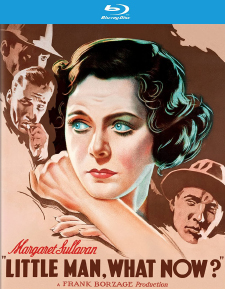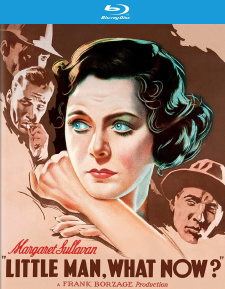Little Man, What Now? (Blu-ray Review)

Director
Frank BorzageRelease Date(s)
1934 (August 9, 2022)Studio(s)
Universal Pictures (Kino Lorber Studio Classics)- Film/Program Grade: B+
- Video Grade: B-
- Audio Grade: B-
- Extras Grade: B-
Review
Frank Borzage isn’t a name that generally gets included in the pantheon of golden age Hollywood filmmakers, alongside the likes of Howard Hawks, John Ford, or Alfred Hitchcock, but he demonstrated an equally distinctive authorial voice that should have earned him a more prominent place in the cinematic popular consciousness. His films lacked the cynicism of Hawks, or the broad Irish sentimentality of Ford, and they certainly didn’t display the ostentatious stylistic flourishes of Hitchcock. Yet he did have a style all of his own, and an unabashedly romantic outlook on life that valued love over everything else—for Borzage, love truly could conquer all, even as the world fell apart around his central couples. His films are melodramas that transcend simple melodramatics to rise to an emotional plane that borders on the spiritual.
That’s especially evident in Little Man, What Now?, his adaptation of the 1922 novel by Hans Fallada. The screenplay by William Anthony McGuire centers around the most purely Borzagian of couples, Emma (Margaret Sullivan) and Hans (Douglass Montgomery). They’re a poor couple who recently got married after Emma became pregnant. Hans needs to retain his job to be able to provide for Emma and their coming child, but the world in which they live is a particularly harsh one, and they soon find themselves at the mercy of Hans’ mercenary mother Mia (Catherine Doucet) and her roguish boyfriend Jachman (Alan Hale, Sr.) Yet even in a cruel and unforgiving world, kindness can arise from the most unexpected places.
There’s a strong sense of social consciousness to Little Man, What Now?, as well as some vaguely anti-fascist themes. It even seems to flirt with sympathy toward an unnamed worker’s movement, but any references to real political movements like Nazism or Communism are oblique at best. Even events that mirrored the very real Depression that was facing American audiences at the time are kept at a distance by the film’s German setting. Borzage was anything but a realist, and his laser-like focus on his central couples kept everything else on the periphery. They exist in a bubble, surrounded by the hazy vicissitudes of fate. Nothing can blur the love that drives them, even when things seem to be at their darkest. Little Man, What Now? ends with a sudden reversal in those fortunes that borders on being a Deus ex machina, but while it may be a bit of a stretch in the dramatic sense, it’s a well-earned one in emotional terms. It’s a release that both Borzage’s characters and his audiences have earned by that point.
Cinematographer Norbert Brodine shot Little Man, What Now? on 35 mm film using spherical lenses, which was finished photochemically, and framed at 1.37:1 for its theatrical release. Kino Lorber’s Blu-ray advertises this version as being a “brand new 2K master,” but there’s no information about the source elements that were used. The original negatives are likely long gone at this point, and it looks like a variety of sources were involved. There’s some speckling, scratches, and other small damage marks throughout the film—things get especially rough at reel changes. There are a few brief moments with heavier damage, and some sections where dupe footage has been inserted, such as a stretch from 46:05 to 48:55. In those cases, the already heavy grain gets substantially coarser, and the image gets softer. On the plus side, the grayscale is fine, and the contrast is generally solid (though it does look a bit flat in some shots). Short of better elements becoming available, this is probably as good as Little Man, What Now? is going to look. Fortunately, the cinematography is beautiful enough that it overcomes any minor flaws in the presentation.
Audio is offered in English 2.0 mono DTS-HD Master Audio, with optional English subtitles. There’s a bit of distortion at times, especially whenever the music reaches a crescendo. Distortion also affects the dialogue, rendering some of it less comprehensible. That’s doesn’t happen too frequently though, and things are generally clear enough to be understood. There are just a few spots where the subtitles might come in handy.
The following extras are included:
- Audio Commentary by Alan Arkush and Daniel Kremer
- The Good Fairy Trailer (SD – 2:46)
- Back Street Trailer (HD – 3:11)
- The Cat and the Canary Trailer (SD – 3:40)
- Desire Trailer (HD – 2:50)
- The Gilded Lily Trailer (SD – 2:44)
- Peter Ibbetson Trailer (HD – 1:56)
- Love Before Breakfast Trailer (HD – 1:28)
Fellow filmmakers and historians Arkush and Kremer are clearly thrilled to be doing a commentary for a Frank Borzage film, and their enthusiasm is infectious. They identify their primary sources as The American Cinema by Andrew Sarris, and Frank Borzage by Herve Dumont. (The latter has an introduction by Martin Scorsese, who also happened to have been one of Arkush’s teachers at film school.) They spend plenty of time on Borzage, but also discuss author Hans Fallada and his sojourn through Nazi Germany, as well as all of the actors involved, especially Sullivan. They put Little Man, What Now? into context in the pre-Code era, noting the greater levels of intimacy displayed between the leads, and point out stylistic differences that Borzage had with other filmmakers of the period. They go off topic occasionally, and apologize for doing so, but their digressions are always as interesting as their discussions of the film itself. This commentary is definitely a good resource to enhance anyone’s understanding of the film.
Despite any imperfections in the video presentation, it’s a treat getting Little Man, What Now? on Blu-ray in any form, and including an appreciative commentary track never hurts. Little Man, What Now? may not necessarily be the best introduction to Borzage, but it’s still a great film, and an essential addition to the collection of any fan of the master director.
- Stephen Bjork
(You can follow Stephen on social media at these links: Twitter and Facebook.)

